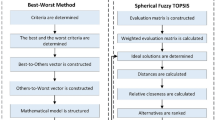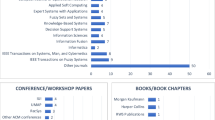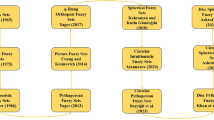Abstract
Emergencies such as natural disasters frequently occur around the world. Large-group emergency evaluation (LGEE) based on Earth observation satellite data is a new model that can potentially reduce the negative impacts of such emergencies. However, in real situations, the different interest preferences and diverse educational backgrounds of evaluators in the evaluation group may cause conflictive preferences, leading to low confidence in the results, which will affect the effect of LGEE. Therefore, this paper aims to devise a two-stage personalized feedback mechanism driven by the dynamic interactive behavior under a social trust relationship to coordinate evaluators’ opinions with conflicting opinions in the LGEE. Firstly, we introduce a family of probabilistic linguistic trust-propagation operators to obtain the complete trust relationship among the group using Archimedean t-norms and then determine the weights of evaluators and the weights associated with each pair of evaluators. Secondly, a Louvain method is used to divide the entire group into several subgroups to reduce computational complexity. Next, a two-stage personalized feedback mechanism is built to manage the consensus levels of intra and inter subgroups by describing the dynamic interactive behavior during the evaluation process. The first stage is to assist evaluators in achieving the consensus within the subgroup. The second stage is devoted to reaching an agreement of each subgroup to the global group. Finally, a case study of the selection problem in emergency task scheduling schemes is undertaken to verify the practicality and validity of the proposed method, followed by some comparative analysis and discussion.




Similar content being viewed by others
References
Bard JF (1991) Some properities of the bilevel programming problem. J Optim Theory Appl 68(2):371–378
Ben-Ayed C, Blair E (1990) Computational difficulties of bilevel linear programming. Oper Res 38(3):556–560
Blondel VD, Guillaume JL, Lambiotte R, Lefebvre E (2008) Fast unfolding of communities in large networks. J Stat Mech Theory Exp. https://doi.org/10.1088/1742-5468/2008/10/p10,008
Cao MS, Wu J, Chiclana F, Herrera-Viedma E (2021) A bidirectional feedback mechanism for balancing group consensus and individual harmony in group decision making. Inf Fusion 76:133–144
Capuano N, Chiclana F, Fujita H, Herrera-Viedma E, Loia V (2018) Fuzzy group decision making with incomplete information guided by social influence. IEEE Trans Fuzzy Syst 26(3):1704–1718
Chu JF, Liu XW, Wang YM (2016) Social network analysis based approach to group decision making problem with fuzzy preference relations. J Intell Fuzzy Syst 31(3):1271–1285
Dong YC, Xu YF, Li HY, Bo F (2010) The OWA-based consensus operator under linguistic representation models using position indexes. Eur J Oper Res 203(2):455–463
Gai TT, Cao MS, Cao QW, Wu J, Yu GF, Zhou M (2020) A joint feedback strategy for consensus in large-scale group decision making under social network. Comput Ind Eng. https://doi.org/10.1016/j.cie.2020.106626
Gao HX, Ju YB, Zeng XJ, Zhang WK (2021) Satisfaction-driven consensus model for social network MCGDM with incomplete information under probabilistic linguistic trust. Comput Ind Eng. https://doi.org/10.1016/j.cie.2021.107099
Gou XJ, Xu ZS, Liao HC (2017) Multiple criteria decision making based on Bonferroni means with hesitant fuzzy linguistic information. Soft Comput 21(21):6515–6529
Guo WW, Gong ZW, Xu XX, Krejcar O, Herrera-Viedma E (2021) Linear uncertain extensions of the minimum cost consensus model based on uncertain distance and consensus utility. Inf Fusion 70:12–26
Kacprzyk J, Fedrizzi M (1988) A ‘soft’ measure of consensus in the setting of partial (fuzzy) preferences. Eur J Oper Res 34(3):316–325
Labella Á, Liu HB, Rodríguez RM, Martínez L (2020) A cost consensus metric for consensus reaching processes based on a comprehensive minimum cost model. Eur J Oper Res 281(2):316–331
Li SL, Rodríguez RM, Wei CP (2021) Managing manipulative and non-cooperative behaviors in large scale group decision making based on a WeChat-like interaction network. Inf Fusion. https://doi.org/10.1016/j.inffus.2021.04.004
Li HH, Ji Y, Gong ZW, Qu SJ (2021) Two-stage stochastic minimum cost consensus models with asymmetric adjustment costs. Inf Fusion 71:77–96
Liang Q, Liao XW, Liu JP (2017) A social ties-based approach for group decision-making problems with incomplete additive preference relations. Knowl-Based Syst 119:68–86
Liu JM, Gao YL (2008) Chaos particle swarm optimization algorithm. Comput Appl 28(2):322–325
Liu PD (2016) The aggregation operators based on archimedean t-conorm and t-norm for single-valued neutrosophic numbers and their application to decision making. Int J Fuzzy Syst 18:849–863
Liu X, Xu YJ, Montes R, Herrera F (2019) Social network group decision making: managing self-confidence-based consensus model with the dynamic importance degree of experts and trust-based feedback mechanism. Inf Sci 505:215–232
Liu YJ, Liang CY, Chiclana F, Wu J (2017) A trust induced recommendation mechanism for reaching consensus in group decision making. Knowl-Based Syst 119:221–231
Lu YL, Xu YJ, Herrera-Viedma E, Han YF (2021) Consensus of large-scale group decision making in social network: the minimum cost model based on robust optimization. Inf Sci 547:910–930
Lu YL, Xu YJ, Huang J, Wei J, Herrera-Viedma E (2022) Social network clustering and consensus-based distrust behaviors management for large-scale group decision-making with incomplete hesitant fuzzy preference relations. Appl Soft Comput. https://doi.org/10.1016/j.asoc.2021.108373
Merigó JM (2011) A unified model between the weighted average and the induced OWA operator. Expert Syst Appl 38(9):11560–11572
Newman MEJ (2004) Analysis of weighted networks. Phys Rev E. https://doi.org/10.1103/PhysRevE.70.056131
Pang Q, Wang H, Xu ZS (2016) Probabilistic linguistic term sets in multi-attribute group decision making. Inf Sci 369:128–143
Pérez LG, Mata F, Chiclana F (2014) Social network decision making with linguistic trustworthiness-based induced OWA operators. Int J Intell Syst 29(12):1117–1137
Pérez-Asurmendi P, Chiclana F (2014) Linguistic majorities with difference in support. Appl Soft Comput 18:196–208
Ren PJ, Xu ZS, Wang XX, Zeng XJ (2021) Group decision making with hesitant fuzzy linguistic preference relations based on modified extent measurement. Expert Syst Appl. https://doi.org/10.1016/j.eswa.2020.114235
Tian ZP, Nie RX, Wang JQ, Zhang HY (2018) A two-fold feedback mechanism to support consensus-reaching in social network group decision-making. Knowl-Based Syst 162:74–91
Wang MW, Liang DC, Xu ZS, Cao W (2021) Consensus reaching with the externality effect of social network for three-way group decisions. Ann Oper Res. https://doi.org/10.1007/s10479-020-03875-3
Wu J, Chiclana F, Herrera-Viedma E (2015) Trust based consensus model for social network in an incomplete linguistic information context. Appl Soft Comput 35:827–839
Wu J, Dai LF, Chiclana F, Fujita H, Herrera-Viedma E (2018) A minimum adjustment cost feedback mechanism based consensus model for group decision making under social network with distributed linguistic trust. Inf Fusion 41:232–242
Wu J, Wang S, Chiclana F, Herrera-Viedma E (2021) Two-fold personalized feedback mechanism for social network consensus by uninorm interval trust propagation. IEEE Trans Cybern. https://doi.org/10.1109/TCYB.2021.3076420
Wu J, Zhao ZW, Sun Q, Fujita H (2021) A maximum self-esteem degree based feedback mechanism for group consensus reaching with the distributed linguistic trust propagation in social network. Inf Fusion 67:80–93
Wu T, Liu XW, Liu F (2018) An interval type-2 fuzzy topsis model for large scale group decision making problems with social network information. Inf Sci 432:392–410
Wu T, Liu XW, Gong ZW, Zhang HH, Herrera F (2019) The minimum cost consensus model considering the implicit trust of opinions similarities in social network group decision-making. Int J Intell Syst 35(3):470–493
Wu XL, Liao HC, Xu ZX, Arian H, Francisco H (2018) Probabilistic linguistic MULTIMOORA: a multi-criteria decision making method based on the probabilistic linguistic expectation function and the improved borda rule. IEEE Trans Fuzzy Syst 26(6):3688–3702
Xiao J, Wang XL, Zhang HJ (2020) Managing personalized individual semantics and consensus in linguistic distribution large-scale group decision making. Inf Fusion 53:20–34
Xu XH, Zhang QH, Chen XH (2020) Consensus-based non-cooperative behaviors management in large-group emergency decision-making considering experts’ trust relations and preference risks. Knowl-Based Syst. https://doi.org/10.1016/j.knosys.2019.105108
Xu YJ, Wen XW, Zhang WC (2018) A two-stage consensus method for large-scale multi-attribute group decision making with an application to earthquake shelter selection. Comput Ind Eng 116:113–129
Xu ZS, He Y, Wang XZ (2019) An overview of probabilistic-based expressions for qualitative decision-making: Techniques, comparisons and developments. Int J Mach Learn Cybern 10:1513–1528
Yager RR (1988) On ordered weighted averaging aggregation operators in multicriteria decisionmaking. IEEE Trans Syst Man Cybern 18(1):183–190
Zhang BW, Dong YC, Zhang HJ, Pedrycz W (2020) Consensus mechanism with maximum-return modifications and minimum-cost feedback: a perspective of game theory. Eur J Oper Res 287(2):546–559
Zhang XL (2018) A novel probabilistic linguistic approach for large-scale group decision making with incomplete weight information. Int J Fuzzy Syst 20:2245–2256
Zhao ZG, Gu XY, Li TS (2007) Particle swarm optimization for bi-level programming problem. Syst Eng Theory Pract 8:92–98
Acknowledgements
This work was supported by the Natural Science Foundation of China (nos. 72071064, 71521001, 71971075).
Author information
Authors and Affiliations
Corresponding author
Ethics declarations
Conflict of interest
The authors declare that they have no conflicts of interest.
Ethical approval
This article does not contain any studies with human or animals performed by any of the authors.
Additional information
Publisher's Note
Springer Nature remains neutral with regard to jurisdictional claims in published maps and institutional affiliations.
Supplementary Information
Below is the link to the electronic supplementary material.
Rights and permissions
Springer Nature or its licensor holds exclusive rights to this article under a publishing agreement with the author(s) or other rightsholder(s); author self-archiving of the accepted manuscript version of this article is solely governed by the terms of such publishing agreement and applicable law.
About this article
Cite this article
Wang, Y., Yan, B., Hu, X. et al. A two-stage personalized feedback mechanism considering dynamic interactive behavior under social network in large-group emergency task scheduling schemes selection. Int. J. Mach. Learn. & Cyber. 14, 587–607 (2023). https://doi.org/10.1007/s13042-022-01652-1
Received:
Accepted:
Published:
Issue Date:
DOI: https://doi.org/10.1007/s13042-022-01652-1




